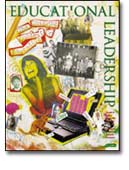"We grow old," a line from Bud Hodgkinson's article (p.6), speaks of the aging teaching population. From T. S. Eliot's "The Love Song of J. Alfred Prufrock," "I grow old" is the lament of a middle-aged man who, caught up in fads and superficialities, has wanted to "squeeze the universe into a ball" but has failed to ask the overwhelming question about the meaning of life.
Having just finished Diane Ravitch's Left Back: A Century of Failed School Reforms (2000), I was beginning to sink into a lament about the state of public education at the end of the year 2000. In an analysis of the trends in education, Ravitch brings home the fact that the curriculum wars have endured for at least 100 years. The debate about what should be taught and to whom erupted in 1893 when the Committee of Ten espoused a liberal education of the highest quality for all students. The curriculum wars continued throughout the 20th century as "the progressives" endorsed such practices as vocational education, social efficiency, mental measurement, child-centeredness, and life adjustment—much to the chagrin of the traditionalists. The wars are now surfacing in movements such as multiculturalism, constructivism, and experience-based education.
According to Ravitch, all these movements (but not the standards movement) have pulled schools away from providing an academic education for all students and have dumbed down the curriculum, resulting in inequity and mediocre achievement. She writes, If there is a lesson to be learned from the river of ink that was spilled in the education disputes of the 20th century, it is that anything in education that is labeled a "movement" should be avoided like the plague. (p. 453)
Caught in the divisive dualism that pervades our politics and media, Ravitch sees history as a battle between traditional and progressive forces. Traditionalists are those who believe in academics and high standards, and progressives must be everyone else. As a historian, Ravitch provides the context of the movements, weighing the complexities of their rationales and the motives of those who supported them. But as an idealist, Ravitch is sure of the answer to the overwhelming question: Every student needs a liberal education.
Although educators will share her passionate belief in education, many will question the logic of lumping all "progressive" reforms together and wonder about her shortsightedness in not examining the underside of the current emphasis on high-stakes testing. Ravitch also fails to credit public schools enough for their contribution to the century: extending education to the largest number of students in history.
After winding up this issue on "The Changing Context of Education"—and reading more T. S. Eliot—I find my sadness about "failed reforms" lifts. For this millennium issue, we asked noted authorities to look backward and forward at the movements in education in which they have been most immersed during their careers. Despite their different perspectives—some might be called progressives and some traditionalists and some neither of the above—these educators find that the future possibilities for schools stir the imagination.
Bud Hodgkinson reminds us how unscientific some formerly held expectations about class, race, and gender have proved, and he gives us insights about ways to embrace our future diversity (p. 6). David Elkind explains why curriculum movements often attempt to solve our most serious social problems, a feat that, although noble, may be impossible (p. 12). Arthur Wise delineates the positive changes that are improving the teaching profession (p. 18). Bob Slavin demonstrates the potential of comprehensive school reform (p. 22), and Barbara Means shows how technology can open the world to students (p.57).
From embracing an inclusive pedagogy (p. 34) to believing in students as our greatest resources in diminishing prejudice and violence (p. 28), these authors document the pragmatic capacity of students, families, and educators to seize the day and transform the present. They do this even as they acknowledge the difficulties and challenges.
They affirm lines from Eliot's "Four Quartets"—lines that express both faith in human potential and acknowledgment of our limitations: <POEM><POEMLINE>And right action is freedom</POEMLINE><POEMLINE>From past and future also.</POEMLINE><POEMLINE>For most of us, this is the aim</POEMLINE><POEMLINE>Never here to be realized;</POEMLINE><POEMLINE>Who are only undefeated</POEMLINE><POEMLINE>Because we have gone on trying.</POEMLINE><ATTRIB>(p. 199)</ATTRIB></POEM>
